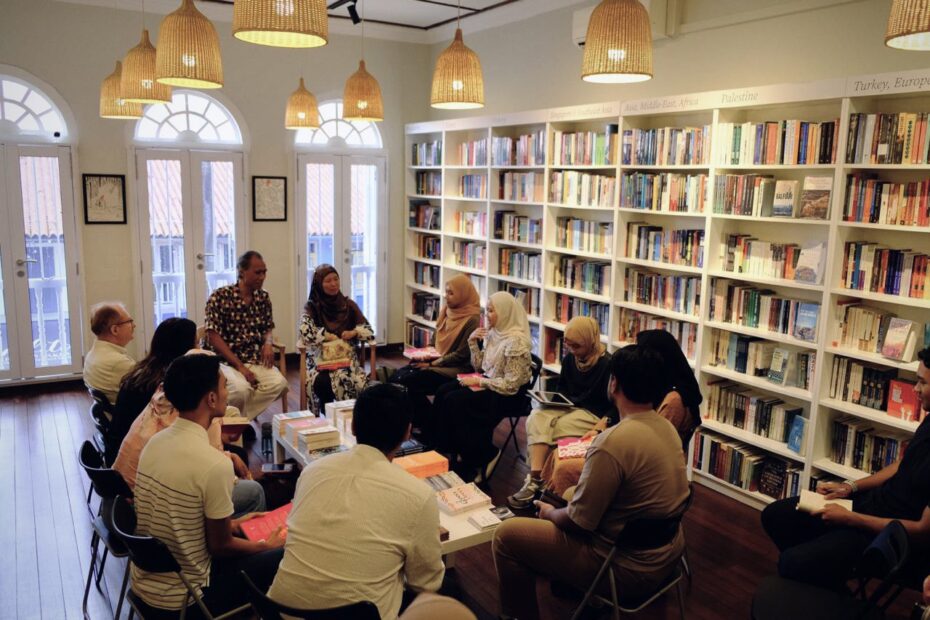A few months ago, the Maktaba Books team decided to host our next book club on Sex, Soul & Islam. What a peculiar topic, right? Others thought so too. “Are you sure about this?” “Is it okay to talk about that in a mixed-sex setting?” Even the team had their doubts, and we were filled with equal parts of excitement and dread for the actual meeting of the book club. Looking back, we can laugh at ourselves because the book club session went off without a hitch. In fact, we walked away having learned so much that we feel it necessary to share it with you as well. Perhaps you can catch us at a future book club, but in the meantime, please take a peek at what was discussed in the span of a few hours as we debunked myths, challenged existing conceptions, and shared tips on sex (no, it is not as scandalous as you think!).
Before reading further, we would like to clarify that the below post is a summary of what was shared. If you would like to learn more about the topic, then please refer to the book itself and other resources.
A few highlights from our discussion:
Sex as an act of worship
One group member shared how sex can be sanctified in marriage and how it can even be understood within the framework of worshiping God. In other words, “Normally we understand having faith in Allah swt to mean obeying His commandments as revealed through His Books, but it can also mean seeking harmony with the order of nature as that too is an expression of our faith in His wisdom. Thus, if sexual urges are part and parcel of our nature, enjoying sex is an expression of faith in God.” The group agreed that it was a new perspective for them to consider “sexual enjoyment [to be] as good as an expression of faith as any other form of worship.”
Sex to be approached with love rather than a right
In Sex, Soul and Islam, the authors point out how some couples may have disagreements because of the way the husband broaches the topic of sex with his wife. For example, some husbands may demand sex from their wives and claim that it is the wife’s religious duty. However, the authors ask “Where is the love, mercy, and tranquillity of Al-Rum 30:21 in such cases?” When one argues that sex is a right in marriage for a partner then what happens to “mutual reciprocity and equitability”? Later on in the Q&A, the authors brought up the concept of consent regarding sex even for married couples.
Hijab goes beyond just wearing a scarf to cover up
When we think of the “hijab,” we usually picture a Muslim woman wearing a headscarf to cover her head to dress modestly. In the book, however, the authors bring attention to the even larger significance of the hijab to women and men alike. “The constituent aspects of the hijab concept are a dressing code against flaunting bodily beauty, the rule prohibiting inter-mingling in private close proximity and the principle of ‘lowering the gaze’ to avoid looks directed at bodily privacies, all of which apply to unrelated members of the opposite sex.”
Most of us in the group confessed that we had not considered such views before. We wondered why this was the case and why we didn’t know much about sex in the context of Islam. The group agreed that there were multiple reasons for the lack of familiarity with the topic:
- Sex education in relation to Islam is not covered in the school setting. If the topic is covered then the focus is entirely on what NOT to do.
- Sex is rarely spoken about openly in households; if so, it is often framed as something wrong or shameful.
- Sex is portrayed simply as a means of expanding the ummah (a form of reproduction).
During the Q&A session, the authors attribute the lack of discussion due to the absence of the appropriate (non-vulgar) terms to describe the sexual organs and the related acts in the Malay language. They even challenged the group to shout out one sex-related word in Malay that is not a vulgarity, but no one could. They explained how other languages such as English and Arabic have proper terminology in addition to the slang version. We found it interesting how language makes certain discussions possible and impossible at the same time. If there are no right words to express something, then actually not much will be discussed about it.
Debunking myths
In Sex, Soul and Islam, the authors try to correct many common misunderstandings of sex in Islam. For example, there is oftentimes more attention paid to the conjugal rights of the husband, but not the wife. Or how shame is hardly discussed even though it can overshadow the act of sex and perhaps even strain relations between partners. As the authors point out, these misunderstandings usually happen because we are not fully aware of the context or the sources that are referenced by others when these “myths” are pushed to us. The group also discussed a few other interesting topics like:
- Incidents of when the husband may misuse religious arguments about not going to bed when invited by the husband and thus, the wife may be cursed by the angels. The group members discussed how these hadiths may actually refer to the couple being careful when handling such situations.
- Incidents of when wives are instructed to be sensitive to their husband’s feelings so that they do not feel rejected and thus, wives must always be agreeable to their husbands’ demands for sex.
- How the balance of power has never been equal between sexes across human history especially around sex within many contexts beyond Islam.
Despite the heavy topics shared, the group wrapped up the discussion with lighter hearts by agreeing that all things must be approached with love and mercy and that we must fully understand the sources of hadiths and other religious teachings before using them to justify our own actions.
How to discuss sex in Islam
Most of us who attended the book club actually had a hard time discussing sex openly. We asked for advice from the authors on how to discuss this topic well and respectfully. They reminded us to:
- Take from Al-Quran and Hadiths
- Don’t talk about your personal sexual activities (Haram)
- Talk about it in a respectful manner with respectful language and appropriate terms
In addition to how the discussions should be held, we were also curious about how to initiate such conversations as future parents or even as the eldest child to their siblings. Their answer was simple – we just need to start talking about it.
Sex education
The last topic that we discussed was sex education. The authors explained that the first step is to reshape the narrative and to shift away from the perspective that sex education is solely an event, i.e., when someone hits puberty then the parents should talk about sex with their child. Instead, the authors challenged us to view sex education as a lifetime journey that begins from birth to marriage and even after marriage as well.
The authors shared how sex education could be split into three parts, the message, values, and modelling.
- The message – What we want to communicate to the individual. For example, sex is a sacred activity that should be protected accordingly.
- The values – Engraining beliefs that motivate one to act in a certain way. Continuing the example earlier, because sex is a sacred activity, there should be a belief in the importance of modesty towards the opposite gender and non-mahrams
- The modelling – showcasing the behaviour and how it should be done. Building on the example: A parent can showcase what is meant by modesty with the way they interact with people of opposite gender and non-mahrams (unrelated).
Adapting sex education based on age
However, what is taught about sex should be suitable for the age of the learner. For example, the objective of sex education for young children is to teach them about modesty and boundaries. They should be taught how to cover up appropriately in public places and how to behave around strangers of the opposite sex. For teenagers, sex education would focus on boy-girl relationships and to avoid having such relationships outside of marriage. Speaking from childrearing experience, the authors shared how teenagers who look for a “girlfriend” or “boyfriend” may be looking for love and affection that was not fulfilled at home. Hence the importance of showing them love as parents and not just ensuring their obedience.
Authors’ Plans after this book
Following the success of Sex, Soul and Islam, the authors plan to:
- Look for a publisher for their recently completed book about marriage entitled Love, Tranquility and Mercy.
- Writing another book on Muslim sex education for children to be used by parents.
- Conducting sex education programmes for youth couples, parents, community, counsellors, and social workers etc.
Books & resources shared during the discussion
During the Q&A section,, the authors, Osman Sidek and Enon Mansor, highlighted how their book is just the beginning of the learning journey and advised us to find more in-depth information from these sources:
- Sexual Health for Muslims
- Aware Academy by Wael Ibrahim
- A taste of honey – Habeeb Akkande
- Rina Malik – doctor in Urology who talks about sexual health etc.
- The Most Controversial Quranic Verse: Why 4:34 Does Not Promote Violence Against Women –John Andrew Morrow
- Amirah Zaky – Sex educator who talks about Vaginismus
In addition to that, they have compiled a list of recommended resources on their website.
Disclaimer: Please note that this post is a summary of what was discussed at the book and are not formal recommendations on the topic of sex and religion. Please refer to the resources listed above or reach out to relevant & recognised experts.

